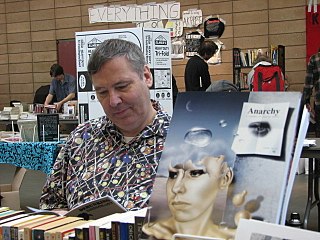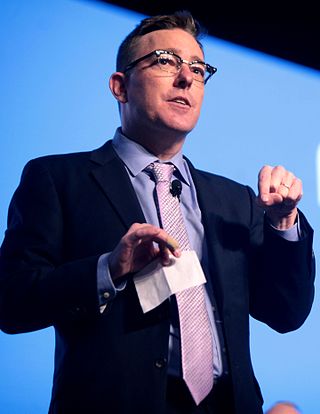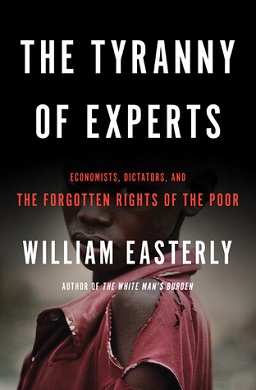
Robert Charles Black Jr. is an American anarchist and author. He is the author of the books The Abolition of Work and Other Essays, Beneath the Underground, Friendly Fire, Anarchy After Leftism, and Defacing the Currency, and numerous political essays.

Bryan Douglas Caplan is an American economist and author. Caplan is a professor of economics at George Mason University, research fellow at the Mercatus Center, adjunct scholar at the Cato Institute, and former contributor to the Freakonomics blog and EconLog. He currently publishes his own blog, Bet on It. Caplan is a self-described "economic libertarian". The bulk of Caplan's academic work is in behavioral economics and public economics, especially public choice theory.

Reason is an American libertarian monthly magazine published by the Reason Foundation. The magazine has a circulation of around 50,000 and was named one of the 50 best magazines in 2003 and 2004 by the Chicago Tribune.
Paleolibertarianism is a libertarian political activism strategy aimed at uniting libertarians and paleoconservatives. It was developed by American anarcho-capitalist theorists Murray Rothbard and Lew Rockwell in the American political context after the end of Cold War. From 1989 to 1995, they sought to communicate libertarian notions of opposition to government intervention using messages accessible to working and middle-class people of the time. This approach, usually identified as right-wing populism, was intended to radicalize citizens against the state. The name they chose for this style of activism evoked the roots of modern libertarianism, hence the prefix paleo. That founding movement was American classical liberalism, which shared the anti-war and anti-New Deal sentiments of the Old Right in the first half of the 20th century.

Alexander Taghi Tabarrok is a Canadian-American economist. With Tyler Cowen, he co-authors the economics blog Marginal Revolution. Tabarrok and Cowen have also ventured into online education with Marginal Revolution University.
The Independent Gay Forum was an organization that sponsored a website featuring free access to articles and opinions penned by gay economical conservative, center-right Independent and libertarian gay authors. Its raison d'etre was dissatisfaction by some lesbians and gay men with the alleged center-left or liberal orthodoxy of the lesbian and gay rights movement in the United States. It was founded around 1998 and dissolved in 2010, believing its mission had been largely accomplished. Its blog, by Stephen H. Miller, continues at the website IGFCultureWatch, which also hosts the Forum's article archives.

Harry Victor Jaffa was an American political philosopher, historian, columnist, and professor. He was a professor emeritus at Claremont McKenna College and Claremont Graduate University, and a distinguished fellow of the Claremont Institute. Robert P. Kraynak says his "life work was to develop an American application of Leo Strauss's revival of natural-right philosophy against the relativism and nihilism of our times".

Nicholas John Gillespie is an American libertarian journalist who was editor-in-chief of Reason magazine from 2000 to 2008 and editor-in-chief of Reason.com and Reason TV from 2008 to 2017. Gillespie originally joined Reason's staff in 1993 as an assistant editor and ascended to the top slot in 2000. He is currently an editor-at-large at Reason. Gillespie has edited one anthology, Choice: The Best of Reason.

Thomas Ernest Woods Jr. is an American author and libertarian commentator who is currently a senior fellow at the Mises Institute. Woods is a proponent of the Austrian School of economics. He hosts a daily podcast, The Tom Woods Show, and formerly co-hosted the weekly podcast Contra Krugman.

Michael Lind is an American writer and academic. He has explained and defended the tradition of American democratic nationalism in a number of books, beginning with The Next American Nation (1995). He is currently a professor at the Lyndon B. Johnson School of Public Affairs at the University of Texas at Austin.

Tyler Cowen is an American economist, columnist and blogger. He is a professor at George Mason University, where he holds the Holbert L. Harris chair in the economics department. He hosts the economics blog Marginal Revolution, together with co-author Alex Tabarrok. Cowen and Tabarrok also maintain the website Marginal Revolution University, a venture in online education.
In the United States, libertarianism is a political philosophy promoting individual liberty. According to common meanings of conservatism and liberalism in the United States, libertarianism has been described as conservative on economic issues and liberal on personal freedom, often associated with a foreign policy of non-interventionism. Broadly, there are four principal traditions within libertarianism, namely the libertarianism that developed in the mid-20th century out of the revival tradition of classical liberalism in the United States after liberalism associated with the New Deal; the libertarianism developed in the 1950s by anarcho-capitalist author Murray Rothbard, who based it on the anti-New Deal Old Right and 19th-century libertarianism and American individualist anarchists such as Benjamin Tucker and Lysander Spooner while rejecting the labor theory of value in favor of Austrian School economics and the subjective theory of value; the libertarianism developed in the 1970s by Robert Nozick and founded in American and European classical liberal traditions; and the libertarianism associated with the Libertarian Party, which was founded in 1971, including politicians such as David Nolan and Ron Paul.

Matthew Lee Welch is an American blogger, journalist, author, and libertarian political pundit.

Benjamin Ginsberg is a libertarian political scientist and professor at Johns Hopkins University who is notable for his criticism of American politics, in which he says that citizens have become "marginalized as political actors" and political parties weakened while state power has grown. His assessment of the futility of voting, along with his notion that the public has an illusion of control over government, has caused controversy. He is a co-author, along with Matthew Crenson, of Downsizing Democracy, 2004, which received critical attention in mainstream newspapers.

The Great Stagnation: How America Ate All the Low-Hanging Fruit of Modern History, Got Sick, and Will (Eventually) Feel Better is a pamphlet by Tyler Cowen published in 2011. It argues that the American economy has reached a historical technological plateau and the factors that drove economic growth for most of America's history are no longer present. These figurative "low-hanging fruit" include the cultivation of much free, previously unused land, technological breakthroughs in transport, refrigeration, electricity, mass communications, sanitation, and the growth of education. Cowen, a professor of economics at George Mason University, theorizes that these factors have contributed to stagnation in the median American wage since 1973.

The Tyranny of Experts: Economists, Dictators, and the Forgotten Rights of the Poor is a 2014 book by the development economist William Easterly. It traces the history of the fight against global poverty, and critically examines the structural incentives of development. He contends that poverty reduction has been used as a tactic to take away the rights of the poor and feed power to the state and corporations. He suggests poverty reduction is better served by greater respect for individual freedom than by a reliance on technocracy.

Nima Sanandaji is a center-right liberal-conservative Iranian-Swedish social and natural researcher. As of 2021, he has 150 scientific mentions related to economics, social sciences, history, biotechnology, polymer technology and physical chemistry. He has published more than 25 books on innovation, entrepreneurship, women’s career opportunities, the history of enterprise and the Nordic welfare states.

Democracy in Chains: The Deep History of the Radical Right's Stealth Plan for America is a 2017 non-fiction book by Nancy MacLean published by Viking Press. MacLean critically examines public choice economics, the philosophy of economist James M. Buchanan at George Mason University, which became a significant influence on the libertarian movement and the Republican Party, and formed the foundation for the political activities of the Koch brothers in the U.S.

Capital and Ideology is a 2019 book by French economist Thomas Piketty. Capital and Ideology follows Piketty's 2013 book Capital in the Twenty-First Century, which focused on wealth and income inequality in Europe and the United States.
















